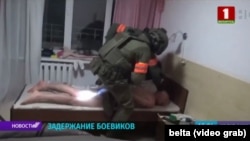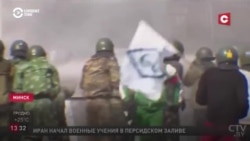Belarus’ July 29 detention of 33 suspected Russian fighters for the Kremlin-linked Vagner military company underlines the central role that the government expects the Belarusian armed forces and Interior Ministry troops to take in the country’s August 9 presidential election.
The Interior Ministry alleged that it had detained the men, all Russian citizens, after receiving information that “more than 200 fighters” had entered Belarus “for destabilizing the situation during the election campaign period.”
All but one of the 33 men, ranging in age from 49 to 24, were picked up at a sanatorium outside of Minsk. The state-run Belarus 1 TV channel broadcast footage from the detentions. The remaining detainee was taken into custody at an unidentified location in southern Belarus, according to government-run media outlets.
Details have not been provided about the investigation. Belarusian law enforcement claims that the Minsk group stood out in part because of “behavior not characteristic of Russian tourists” – in the words of the official BelTA news agency, they did not consume alcohol or “visit entertainment establishments,”. The men supposedly wore similar, military-style clothes.
At an emergency Security Council meeting to discuss the situation, Belarusian President Alyaksandr Lukashenka took aim at Russia, saying, without elaboration, that Moscow is trying “to justify its dirty intentions.”
As yet, the Kremlin has not officially responded to the detentions. Russia’s ambassador to Belarus, Dmitry Mezentsev, told the state-run Russian news agency TASS that the Russian embassy in Minsk has no official information about those detained and has requested “the competent organs” for the details.
The detentions took place on the eve of a planned rally in Minsk by prominent opposition presidential candidate Svyatlana Tsikhanouskaya, who has called for fresh, "free and fair" national elections. Her campaign is supported by two would-be presidential candidates who claim the Belarusian government has targeted them for political reasons.
Jailed banker Viktar Babaryka, who formerly ran the Gazprom-owned Belgazprombank in Belarus is facing charges, with his son, Eduard, for various alleged financial crimes. Entrepreneur and former ambassador to the U.S. Valer Tsapkala fled to Moscow last week with his two children, reportedly to avoid arrest.
Over the past month, as rallies for Tsikhanouskaya have picked up momentum throughout Belarus, 65-year-old President Lukasehnka, in power since 1994, has repeatedly emphasized to the armed forces and Interior Ministry troops the dangers of unrest in Belarus’ presidential election and the need to protect the country’s “sovereignty.”
Speaking to the Interior Ministry’s Military Unit 3214 on July 28, he identified “preserving the country” and “not allowing destabilization” as the “most important and primary task” before both the president and law enforcement.
“The issue of the presidential elections is secondary,” he added.
At a July 24 appearance at the 5th special forces brigade at Maryina Horka, about an hour southeast of Minsk, the Belarusian leader singled out private foreign military companies in this regard.
“[A]ll wars now start with street protests, demonstrations, then Maidans,” he observed, referring to the 2014 demonstrations in Ukraine against election fraud that led to the overthrow of Ukrainian President Viktor Yanukovych. “At a Maidan, if they don’t have their own people …. they’ll bring them in from the side. These are professional soldiers, bandits. They are specially prepared -- basically within the framework of private military companies -- throughout the world and earn big money for provocations in various states.”
The Vagner Group is the best-known regional example of a private military company believed to operate in the countries that Lukashenka cited – Libya, Syria, and Iraq. In his July 24 speech, though, Lukashenka did not mention the Vagner Group by name.
Government allegations about supposed “foreign fighters” at work in Belarus during times of national political tension have occurred before, however.
Ahead of the 2006 presidential elections, the State Security Committee (KGB) supposedly uncovered “militarized camps” for training fighters “to organize mass disturbances” during the vote. On election day itself, the special services allegedly prevented a terrorist attack in downtown Minsk. No further information about the fate of these supposedly detained “fighters” and “terrorists” was made public.
Similarly, in 2017, during national protests against taxes on so-called “parasites,” or unemployed people, officials announced that a camp of fighters had been found near the towns of Bobruisk and Asipovichy, not far from Minsk. The KGB claimed that jeeps with fighters had broken through the Belarusian-Ukrainian border. These allegations, however, never led to criminal charges, and those detained were eventually released.
Of late, Lukashenka has indicated that the armed forces could be used to put down any perceived threat to Belarus’ stability. To support this scenario, he has referenced what he incorrectly terms U.S. President Donald Trump’s recent deployment of “the army” to U.S. cities to contend with a variety of tasks, including disturbances to public order.
“If the president of the U.S. withstands this pressure, this will be a good sign for us, too,” Lukashenka told members of the Belarusian special forces, the state-run BelTA news agency reported on July 24.
Lukashenka involving the army or special forces to suppress public demonstrations or protests during the election period cannot be excluded, commented Andrey Porotnikov, who manages the Belarus Security Blog.
But, he emphasized, these would be “extreme cases.” Belarus’ Interior Ministry troops alone are “completely sufficient to control the situation,” Porotnikov said.
One former officer in the Belarusian Interior Ministry troops told RFE/RL’s Belarusian Service that the special forces, which make up part of the Belarusian army, “are training very actively” to handle unrest connected with the August 9 election.
“They’re going out wherever they can,” said the officer, who requested anonymity. “I talked with my former fellow officers, we discussed the situation. They all say that we won’t have any kind of Maidan at all.”
Lukashenka also has targeted foreign media companies as potential threats in this regard.
He has accused the BBC and Radio Free Europe/Radio Liberty of allegedly attempting to incite unrest with their election coverage and called for their expulsion from the country. (RFE/RL, which leads Current Time in association with the Voice of America, has rejected these accusations.)
Lukashenka’s chief challenger, Svyatlana Tsikhanouskaya, however, interprets the president’s claims about an attempt at a Maidan-style uprising as a scare tactic to squash dissent.
“We say that we want a new president, but the authorities respond to us that then there’ll be a Maidan,” Tsikhanouskaya said in a July 21 speech televised by the official Belarus 1 TV channel. “We say that the majority of Belarusians want to live in a free, wealthy country, but the authorities threaten us with a Maidan ...”
“Do you, what, want a Maidan?’ the authorities ask,” she said. “No, we don’t want that. And we won’t let them do this.”
In the name of ensuring law and order, police already have detained hundreds of opposition activists, journalists, bloggers, and others since early May, when preparations began for the election campaign.
On July 28, those detentions continued when 11 journalists from Reuters, TASS, and the independent Belarusian outlets TUT.by, Belsat, and BelaPAN were detained by masked riot police outside KGB headquarters in Minsk, the Belarusian Association of Journalists reported. Some of the journalists were later released.
Riot police also detained 35 ordinary Belarusians bringing petitions for Viktar Babaryka’s release from prison on bail, the human-rights monitor Vyasna reported.
An earlier petition brought by Maryya Kalesnikava, a Tsikhanouskaya ally and coordinator of Babaryka's campaign, had met with a gentler response, however.
Kalesnikava described the KGB representatives to RFE/RL's Belarusian Service as "polite and friendly."







